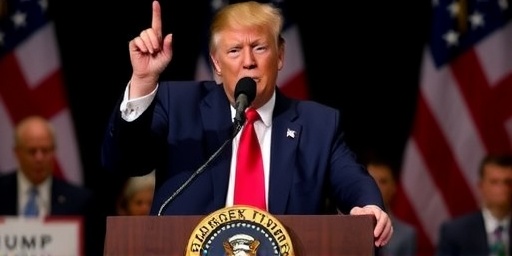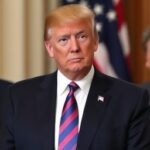In a blistering post-election speech that electrified supporters and ignited critics, President-elect Donald Trump declared war on what he termed the ‘deep state,’ vowing swift retaliation against entrenched bureaucrats who he accuses of undermining his agenda. Delivered under the palm trees of Palm Beach, Florida, on November 15, 2024, the address marked a combative start to Trump‘s second term preparations, just weeks after his decisive victory in the 2024 presidential election.
Trump‘s words, laced with the signature bravado that defined his 2016 campaign, painted a picture of a shadowy network within the federal government sabotaging American interests. ‘They thought they could stop us, but we won bigly,’ Trump proclaimed to a roaring crowd of thousands at the Mar-a-Lago estate. ‘Now, it’s time for payback. The deep state is going down.’ The speech, lasting over 45 minutes, drew cheers from loyalists and immediate backlash from Democrats and even some Republicans wary of escalating internal conflicts.
Trump’s Unfiltered Assault on Federal Bureaucracy
From the outset, Trump’s speech zeroed in on the federal bureaucracy as the primary target of his retaliation. He described the deep state not as a vague conspiracy but as a specific cadre of unelected officials in agencies like the FBI, CIA, and Department of Justice who, in his view, have weaponized their power against political opponents. ‘These aren’t just pencil-pushers; they’re the enemies within,’ Trump stated, his voice rising with each accusation. He referenced past grievances, including the Russia investigation during his first term and what he called ‘witch hunts’ over classified documents.
Statistics underscore the scale of the bureaucracy Trump aims to tackle. The U.S. federal government employs over 2.1 million civilian workers, with agencies like the IRS and EPA often cited by conservatives as bloated and overreaching. Trump promised to slash regulations by 70%, echoing his first-term achievements where he rolled back 22,000 pages of federal rules. ‘We’ll fire the leeches and hire patriots,’ he vowed, outlining plans for mass terminations and loyalty tests for new appointees. This rhetoric harks back to his election campaign promises, where he positioned himself as the ultimate outsider fighting a rigged system.
Supporters at the event, many waving ‘MAGA’ flags, erupted in applause as Trump detailed his vision. One attendee, Florida retiree Maria Gonzalez, told reporters, ‘Finally, someone’s going to clean house. The deep state stole years from his first presidency.’ Yet, the speech’s intensity raised eyebrows, with legal experts noting that such vows could invite lawsuits under civil service protections established by the Pendleton Act of 1883.
Memorable Quotes That Defined the Florida Rally
The Mar-a-Lago speech was a masterclass in Trump’s oratorical style—raw, repetitive, and relentlessly optimistic about his retribution plans. Key lines reverberated across social media, amassing millions of views within hours. ‘The election was a landslide against the deep state, and now the retaliation begins,’ Trump declared early on, tying his victory—where he secured 312 electoral votes and 51% of the popular vote—to a mandate for overhaul.
Another standout moment came when Trump mocked former intelligence officials, naming figures like ex-FBI Director James Comey and CIA Director John Brennan as exemplars of the deep state. ‘They spied on my campaign, leaked lies, and now they’ll pay the price,’ he said, prompting chants of ‘Lock them up!’ from the crowd. The speech also touched on economic retaliation, promising audits of agencies that ‘wasted trillions’ on green energy initiatives, which Trump labeled as deep state favoritism toward liberal causes.
Video clips of these moments went viral, with #TrumpRetaliation trending on X (formerly Twitter) and garnering over 5 million posts in the first 24 hours. Political analysts compared it to Trump’s 2017 inauguration address, but noted a sharper edge post-election. ‘This isn’t campaigning anymore; it’s governing with a vengeance,’ said GOP strategist Alex Conant in a post-speech interview.
To illustrate the speech’s structure, Trump divided his address into thematic segments: first, recounting election triumphs; second, exposing deep state ‘crimes’; and third, blueprinting retaliation through executive orders. He even teased a ‘Deep State Task Force’ led by loyalists like Stephen Miller, aimed at rooting out dissenters.
Reactions Ignite Across the Political Spectrum
The speech’s fallout was swift and polarized, with reactions pouring in from Washington to Wall Street. Democrats decried it as authoritarian overreach, while many Republicans hailed it as necessary housecleaning. House Minority Leader Hakeem Jeffries issued a statement calling Trump’s vows ‘a dangerous assault on democratic institutions.’ He warned that targeting civil servants could paralyze government operations, citing a 2023 Government Accountability Office report that found 40% of federal employees already face morale issues from political turbulence.
- Democratic Response: Senate Majority Leader Chuck Schumer labeled the speech ‘paranoid revenge porn,’ urging bipartisan safeguards. Progressive groups like the ACLU mobilized, preparing legal challenges under the Administrative Procedure Act.
- Republican Support: House Speaker Mike Johnson praised Trump, saying, ‘The deep state has evaded accountability for too long. This election was a referendum on reform.’ Figures like Sen. Ted Cruz echoed calls for hearings into intelligence abuses.
- Independent Voices: Bipartisan watchdogs, including the Project on Government Oversight, expressed concerns over politicizing the workforce, potentially violating Hatch Act provisions.
Public opinion polls reflected the divide. A snap survey by Quinnipiac University post-speech showed 55% of Republicans approving of Trump’s retaliation plans, versus 12% of Democrats. Independents split at 38% support, highlighting the speech’s role in deepening partisan rifts. Internationally, allies like UK Prime Minister Keir Starmer offered measured congratulations on the election but avoided commenting on the deep state rhetoric, while adversaries in Beijing mocked it as ‘American infighting.’
Media coverage amplified the debate. CNN ran segments questioning the legality of mass firings, while Fox News framed it as ‘long-overdue justice.’ The speech’s timing, just after Trump’s election certification by Congress, amplified its impact, signaling that his administration would prioritize vendettas over olive branches.
Unpacking the Deep State Myth in Trump’s Narrative
Central to the speech was Trump’s persistent framing of the deep state as a cabal of careerists blocking his ‘America First’ policies. Historians trace the term’s modern usage to the 2010s, popularized by Trump allies like Steve Bannon. In Trump’s telling, it encompasses not just spies but regulators who enforced COVID-19 mandates and environmental rules he deems excessive. ‘The deep state is why your groceries cost more— they’re in bed with globalists,’ he claimed, linking it to inflation rates that peaked at 9.1% in 2022.
Contextually, Trump’s first term saw clashes with the bureaucracy, including the firing of Comey in 2017 and the ousting of inspectors general amid Ukraine impeachment probes. Post-election, with a Republican-controlled Senate, he faces fewer checks. Yet, challenges persist: The Supreme Court’s 2024 ruling in Trump v. United States on presidential immunity could shield some actions, but lower courts might block others.
Experts weigh in on the feasibility. Former White House counsel Don McGahn advised in a recent op-ed that targeted reforms, like Schedule F reimplementation—which would reclassify 50,000 policy jobs as at-will—could achieve retaliation without chaos. Conversely, the Brennan Center for Justice predicts ‘institutional sabotage,’ estimating up to 100,000 potential lawsuits if purges ensue.
Trump’s speech also nodded to cultural deep state elements, criticizing ‘woke’ influences in the military and education departments. This resonated with his base, where a 2024 Pew Research poll showed 68% of Republicans believe a deep state exists and opposes Trump.
Blueprints for Retaliation and Future Governance Shifts
Looking ahead, Trump’s speech outlined concrete steps for dismantling the deep state, promising executive actions on Day One of his January 20, 2025, inauguration. Among them: Reviving the aforementioned Schedule F to ease firings, creating a commission to audit intelligence failures from the 2020 election, and withholding funds from ‘disloyal’ agencies. ‘Retaliation isn’t revenge; it’s justice for the forgotten men and women,’ Trump emphasized, framing it as populist empowerment.
Implications ripple through sectors. Wall Street futures dipped 1.2% post-speech amid fears of regulatory upheaval, while defense contractors like Lockheed Martin saw stock bumps from anticipated military purges. Economically, Trump’s vows align with his election platform of 10% tariffs and energy deregulation, potentially slashing deep state ‘obstacles’ to drilling in Alaska.
Long-term, this could reshape federalism. States like Texas and Florida, already passing anti-deep state laws, may see federal deference. However, risks loom: A divided Congress could stall confirmations, and whistleblower protections might fuel leaks. As Trump prepares his cabinet—rumored to include firebrands like Kash Patel for FBI director—the speech sets a tone of unrelenting confrontation.
Ultimately, the address positions the incoming administration as a wrecking ball against entrenched power, with the 2024 election serving as its battering ram. Whether this leads to renewal or reckoning remains the burning question as America braces for Trump’s return.








